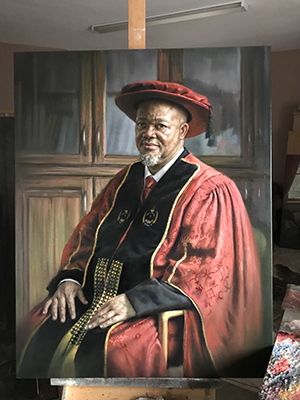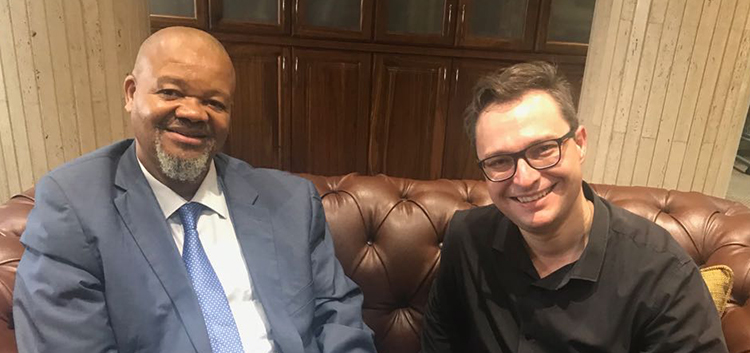News & Events
Unisa alumnus captures the essence of Makhanya

The portrait of Prof. Makhanya, painted by artist and alumnus Jaco van Schalkwyk
Larger-than-life portraits of past Unisa Chancellors and Principals, and also Chairpersons of Council, adorn the wooden panels of the ZK Matthews and Senate Halls in the Winnie Madikizela-Mandela Building. These works of art, also to be found in the Council Chambers on the main campus in Pretoria, truly capture the history and culture of Unisa.
For many years, the Unisa Art Department commissioned different artists to create these works of art. This time, Unisa approached alumnus Jaco van Schalkwyk (39), a visual artist who specialises in oil paintings and installations, to showcase his portraiture skills by painting a portrait of Professor Mandla Makhanya. The former Principal and Vice-Chancellor (VC) of Unisa’s tenure ended in December 2020. He was gifted the portrait at his farewell function in May 2021.
The journey to have a portrait painted of Professor Makhanya began in 2018 and was completed in 2019. The 115 cm x 90 cm art piece is an oil painting done on Belgian linen detailing the old masters in Renaissance technique that was an art style prevalent in Europe during the 1400s AD.
Jaco prefers to use old European techniques. “These techniques”, he says, “are able to ensure that a product will last forever. Most importantly, though, the work will invoke the emotions of the viewer. The art in this era depicts the emotions of the subject making the portrait to appear more natural.”
His other influence comes from Rembrandt van Rijn, the famous Dutch painter, art dealer and the greatest artist to have lived during the 1600s. The famous painter influenced his work on the portrait. “I specifically had Rembrandt in mind when I did the portrait because his work was focused on the richness of the detail.”
The artist points out that he used the sfumato technique where there is much glazing with a bright light on the face that creates an illusion. This technique was also used by the famous painter, Leonardo da Vinci, to paint the Mona Lisa. “The technique prevents a too-bright appearance. The painting is subdued, has an antique aura and looks aged.”
Jaco based this portrait on a photograph that included a sitting with the former VC. “I requested a particular angle, light source and environment. I also met Professor Makhanya in person while in the middle of the painting process, which I believe is very important in order to create a good likeness and really capture someone’s character.”

The artist meeting Prof. Makhanya
“A sitting is ‘gold’ because in that time you get to formulate first impressions. I got to know Prof Makhanya a little. He came across as a stable, strong but gentle leader. An artist has to make the subject appear how people refer to them.”
Artists use sittings as opportunities to capture the personal traits of subjects in their paintings. Most importantly, this is to capture the spirit of the person. Jaco mentions that painting is a spiritual act. He gives this example: “With painting, the artist puts a lot of expressive energy onto the surface and a lot of themselves when it comes to the ‘mark making’ process. If one or more painters use the same photo as reference to paint a portrait, it will always look different.”
Throughout the process, Jaco was guided by Dr Gwen Miller, Senior Lecturer in Visual Arts, Department of Art and Music at the College of Human Sciences, together with the portrait commissioning committee under the chairmanship of the Acting Registrar at the time. They had to monitor the progress on the work, which Miller confirms, “is an integral part of the process and aims to monitor the photographic documentation of the office bearer, quality of materials and format used as well as the technical quality of the artwork”.
Broadly, Unisa has maintained this form of art because oil paintings and portraits offer durability but also capture the culture of a particular time and the character of a subject for prosperity. “If you stand in front of the portrait of the VC, one not only experiences the ‘picture’ of a person but one also experiences the presence of his stature and the intensity of months of labour and of the artist's dedication,” adds Miller.
At the time, Jaco also mentored two artists as part of his loyalty to and support of Unisa and other young artists. As an alumnus of Unisa, he feels the institution afforded him the knowledge to be a better artist and that he would definitely further his studies with the university.
Jaco’s resume reads that well-known artist Marie Breedt mentored him for ten years while he studied for his BA degree in Historical Studies at Unisa, majoring in Art History and Archaeology. He is represented by the Barnard Gallery in Cape Town.
* By Busisiwe Mahlangu, Communication Coordinator, Department of Institutional Advancement
Publish date: 2021/06/01
